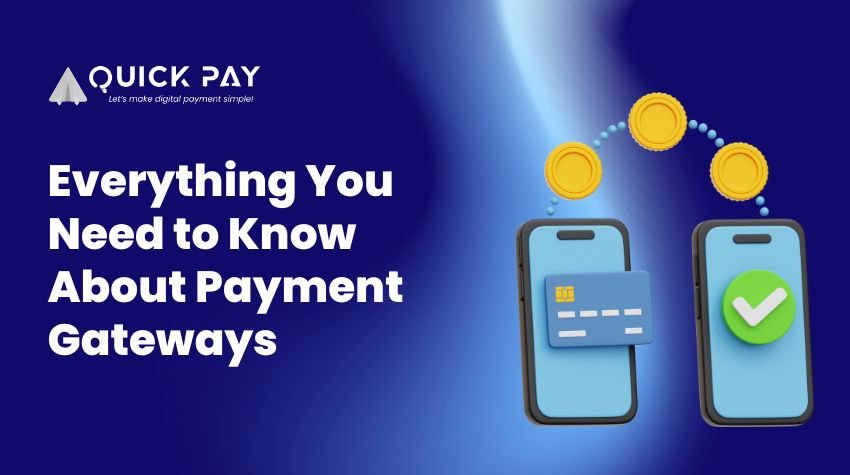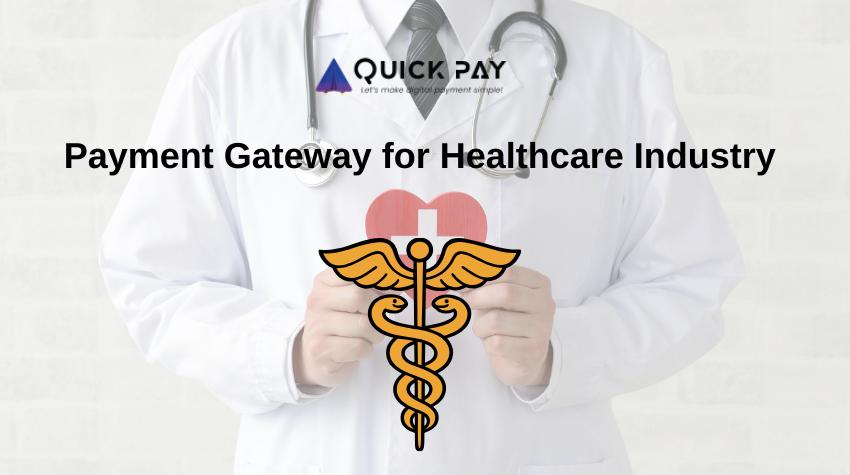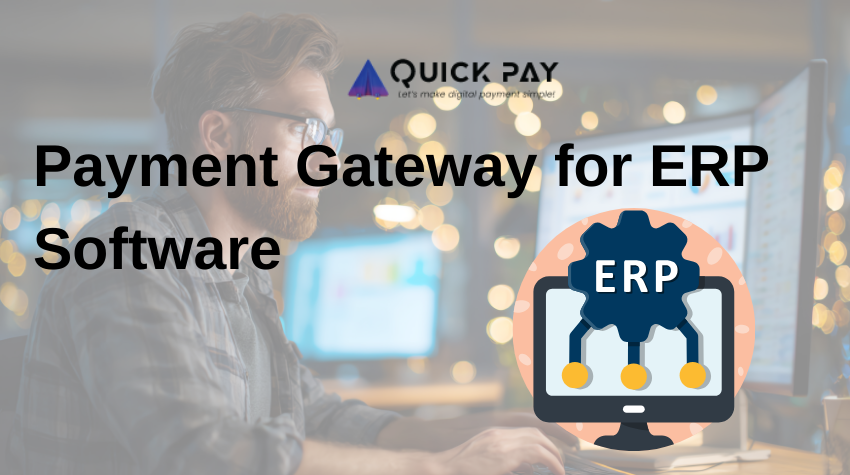Everything You Need to Know About Payment Gateways
In today's digital-first world, online transactions are the heartbeat of commerce. From paying your utility bills to splurging on a new gadget, the act of buying and selling online feels almost magical in its simplicity. Yet, behind every successful "click to pay" lies a sophisticated, often unseen, technological hero: the payment gateway.
You might not even realize it's there, but without a robust payment gateway, seamless and secure online payments would be a distant dream. This comprehensive guide will pull back the curtain on this essential technology, explaining what it is, how it works, why it's indispensable for your business, and how to choose the best payment gateway for your specific needs. We'll even offer insights from leading solutions like Quickpay, which is simplifying digital payments for businesses across India.
What Exactly is a Payment Gateway? Demystifying the Digital Bridge
At its core, a payment gateway is a service that securely authorizes and processes credit card and other direct payment transactions for online businesses. Think of it as a digital bouncer or a secure bridge, ensuring that sensitive payment information travels safely and efficiently between you, your customer, and the banks involved.
Its core functions are critical:
- Data Encryption: It scrambles sensitive payment details like card numbers and CVVs, protecting them from interception.
- Secure Data Transmission: It ensures this encrypted data is sent securely to the payment processor.
- Authorization Request & Response: It facilitates the request for transaction approval from the customer's bank and relays the decision back to your business.
- Fraud Detection & Prevention: Many gateways, like Quickpay, include built-in tools that proactively identify and prevent suspicious transactions, boosting your transaction success rates while minimizing risks.
- Tokenization: For enhanced security, it replaces sensitive card data with a unique, non-sensitive "token" after the first transaction.
It's crucial to distinguish a payment gateway from a payment processor. The gateway focuses on the secure transfer and authorization of data, while the processor handles the actual movement of funds between banks. They work hand-in-hand to complete a transaction.
The Workflow: How a Payment Gateway Makes it Happen - A Step-by-Step Journey
The seemingly instantaneous nature of online payments hides a complex, multi-step process powered by the payment gateway. Here's a simplified breakdown:
- Customer Initiates Payment: A customer selects products on your e-commerce site or a parent pays school fees via an online portal like Quickpay.
- Data Capture & Encryption: Payment details are entered, immediately encrypted by your system, and sent to the payment gateway.
- Gateway to Processor: The gateway transmits this encrypted data to your payment processor.
- Processor to Acquiring Bank: The processor sends the transaction details to your acquiring bank (the bank that handles your business's transactions).
- Acquiring Bank to Card Network: Your acquiring bank forwards the request to the relevant card network (e.g., Visa, Mastercard).
- Card Network to Issuing Bank: The card network routes the request to the customer's issuing bank (the bank that issued their card).
- Issuing Bank Decision: The issuing bank verifies funds/credit and approves or declines the transaction.
- Response Back Through the Chain: The decision travels rapidly back through the card network, acquiring bank, processor, and finally to your payment gateway.
- Gateway to Merchant: The gateway relays the final approval or decline message to your website.
- Merchant to Customer: The customer sees a "Transaction Approved" or "Transaction Declined" message.
This entire sequence, from click to confirmation, occurs in mere seconds, underpinned by robust security measures to ensure both speed and trust.
Why Your Business Can't Live Without a Payment Gateway: The Indispensable Benefits
For any business operating online, a payment gateway isn't just an option; it's a necessity. Here's why:
- Enabling Online Sales & E-commerce: Simply put, no payment gateway means no online transactions. For businesses like educational institutions, it's the fundamental tool for hassle-free fee collection.
- Fortified Security & Fraud Protection: Gateways are your first line of defense. They ensure PCI DSS compliance (Payment Card Industry Data Security Standard), which is vital for protecting sensitive customer data. Many, like Quickpay, offer sophisticated fraud prevention tools that proactively identify and deter suspicious transactions, boosting your approval rates.
- Enhanced Customer Experience & Trust: A seamless and secure checkout process reduces friction, leading to higher conversion rates. Customers appreciate having multiple payment options, and knowing their data is safe builds immense trust. Quickpay, for instance, offers over 50 payment options, including UPI, cards, and net banking, providing a one-stop solution for diverse customer preferences.
- Global Reach & Currency Flexibility: Expand your market beyond geographical boundaries. Payment gateways allow you to accept payments from customers worldwide in various currencies.
- Operational Efficiency & Automation: Gateways automate the entire transaction process, drastically reducing manual effort in handling payments. Their powerful dashboards, like Quickpay's, streamline reconciliation, manage refunds, and provide detailed reports, allowing you to focus on your core business.
- Data & Analytics for Business Insights: Beyond transactions, gateways offer valuable data on sales trends, customer behavior, and payment patterns, empowering better business decisions.
- Accept Payments Without a Website: Solutions like Quickpay even cater to businesses without a dedicated website, enabling them to accept digital payments effortlessly.
Types of Payment Gateways: Finding the Right Fit for Your Business
Choosing the right type of gateway is crucial. Here are the most common options:
- Hosted Payment Gateways (Redirect Gateways):
- How They Work: Customers are redirected from your website to a secure payment page hosted by the gateway provider.
- Pros: Easiest to set up, highly secure (the gateway handles most PCI compliance burden), ideal for startups and smaller businesses.
- Cons: Less control over checkout branding, potential for slight customer friction due to redirection.
- Examples: PayPal Standard, Stripe Checkout, Square.
- Self-Hosted / Integrated Payment Gateways (API Gateways):
- How They Work: Payment processing occurs directly on your website, giving you full control over the user experience. The gateway provides APIs (Application Programming Interfaces) for secure communication behind the scenes.
- Pros: Complete control over UI/UX and branding, seamless integration with your website's design. Quickpay offers developer-friendly APIs and plugins for effortless integration with existing CRM/ERP software.
- Cons: Requires more technical development expertise, and your business takes on more responsibility for PCI compliance.
- Examples: Stripe API, Braintree, Authorize.net (API integration).
- API Hosted Payment Gateways (Client-Side Encryption):
- How They Work: Payment data is encrypted directly in the customer's browser before it even reaches your server, then sent to the gateway via API.
- Pros: Offers high security while maintaining significant control over your UI/UX, significantly reducing your PCI scope.
- Cons: Still requires development knowledge for implementation.
Key Factors When Choosing Your Payment Gateway: How to Identify the Best Fit
Finding the best payment gateway for your business isn't a one-size-fits-all answer. It involves carefully evaluating your unique needs against several critical factors:
- Pricing Model & Transaction Fees: Look for transparent pricing. Compare per-transaction fees (percentage + fixed fee), monthly fees, setup fees, and chargeback fees. Quickpay, for example, offers a simple, transparent pricing model of 2% fee per transaction amount, making it cost-effective for small businesses.
- Security Features & PCI DSS Compliance: This is paramount. Ensure the gateway is PCI DSS compliant and offers robust fraud prevention tools like AVS, CVV checks, device fingerprinting, and machine learning for anomaly detection, as highlighted by Quickpay's strong security measures.
- Supported Payment Methods & Currencies: Does it accept the payment methods your target audience prefers? (e.g., credit/debit cards, UPI, net banking, digital wallets like Apple Pay, Google Pay). For businesses in India, Quickpay's support for over 50 payment options is a significant advantage. If you plan to sell internationally, ensure it supports multiple currencies.
- Ease of Integration & Technical Support: How easily does it integrate with your existing e-commerce platform (Shopify, WooCommerce, custom-built)? Look for developer-friendly APIs and comprehensive documentation, along with responsive technical support. Quickpay emphasizes effortless integration and dedicated support.
- Fraud Prevention & Risk Management Tools: Beyond basic checks, does it offer advanced, customizable fraud prevention tools to minimize chargebacks and losses? Quickpay's proactive fraud identification ensures higher success rates.
- Payout Speed & Settlement Times: How quickly do your funds reach your bank account after a transaction? Faster access to funds can significantly impact your cash flow.
- Reporting & Analytics Capabilities: Can you access real-time transaction monitoring, detailed sales reports, and customer insights? A powerful dashboard, like Quickpay's, is crucial for effective financial management and reconciliation.
- Scalability & Reliability: Can the gateway handle increased transaction volume as your business grows? High uptime and a reliable service are non-negotiable. Quickpay aims to help small businesses expand with cost-effective solutions.
- Customer Support & Service Level Agreements (SLAs): What kind of support is available (24/7, phone, email, chat)? Prompt and knowledgeable assistance is invaluable when issues arise. Quickpay provides accessible contact information for support.
The Future of Payment Gateways: Innovations on the Horizon
The world of digital payments is constantly evolving, and payment gateways are at the forefront of this innovation:
- AI and Machine Learning: Expect more sophisticated fraud detection and hyper-personalized checkout experiences.
- Rise of Alternative Payment Methods: "Buy Now, Pay Later" (BNPL), cryptocurrency payments, and Open Banking initiatives will continue to gain traction.
- Seamless & Invisible Payments: One-click purchases, subscription models, and in-app payments will make transactions even more integrated and less noticeable.
- Enhanced Security Technologies: Biometrics, advanced tokenization, and cutting-edge encryption will make payments even more secure.
- Focus on User Experience: Simplification of the checkout process, with features like dynamic payment buttons and pre-filled forms, will remain a priority.
Conclusion: Powering Your Digital Economy
Payment gateways are more than just a piece of technology; they are the backbone of secure and efficient online commerce. They empower businesses, from thriving e-commerce stores to educational institutions collecting fees, to accept digital payments seamlessly and securely.
Choosing the best payment gateway isn't just a technical decision; it's a strategic move that directly impacts your business's growth, customer satisfaction, and profitability. By carefully evaluating your needs against the factors discussed, and considering innovative solutions like Quickpay, you can find the perfect partner to power your digital economy.
Equipped with this knowledge, you're now ready to make informed decisions about your payment processing needs. Evaluate your options carefully, prioritize security and user experience, and set your online business up for lasting success!
What's your experience with payment gateways? Share your insights or questions about finding the best payment gateway for your business in the comments below!
















